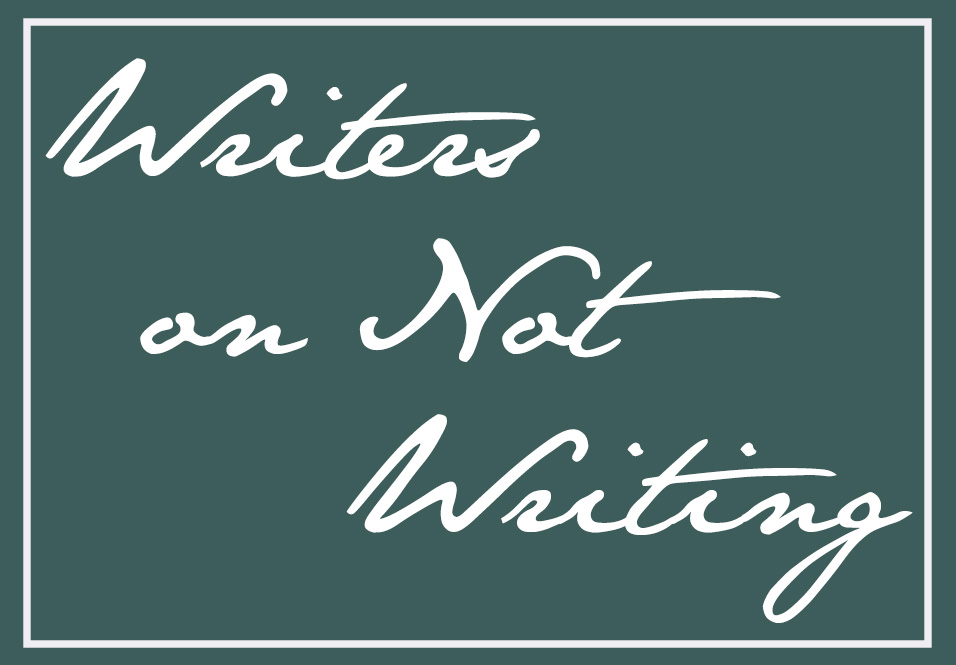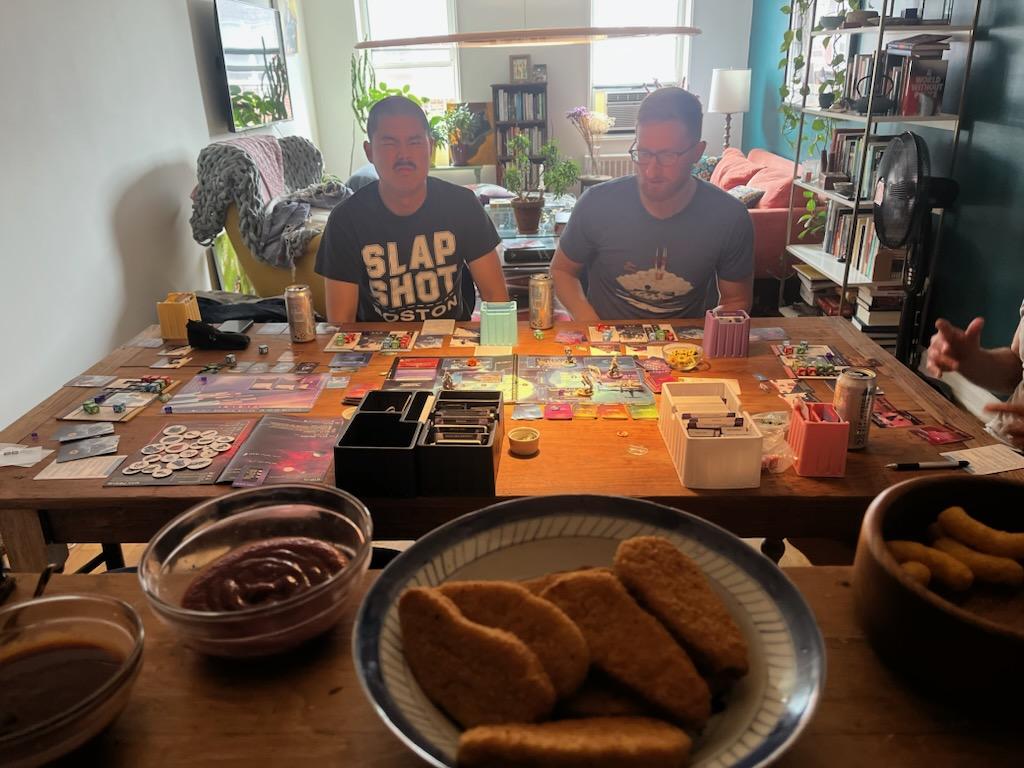Writers pour so much energy into their craft that sometimes we forget that creative pursuits other than writing can fill us up in other important ways. Here, we’ll look at what writers do when they aren’t writing, and how those pursuits affect the return to the page. This month, we hear about acting and gaming from Nancy Crochiere and Nick Fuller Googins.

When I’m not busy writing, one of my favorite pastimes is acting as an “extra” in movies and TV shows. The days on set can be long, and sometimes the scene you shoot for an entire afternoon doesn’t make it into the final cut, but regardless, it’s fascinating to watch the directors and cast working together to reveal character and heighten drama.
As an extra, your movements are carefully planned and regulated. Some days my only job has been to walk down a sidewalk. Other times, you’re given more freedom—perhaps even a bit of motivation and backstory. I once played a distraught mother-of-the-bride who watched in horror as a young woman swooped in to ruin her daughter’s wedding. There can be different kinds of rewards, too, In the movie Joy, I played a QVC phonebank manager and got to spend the afternoon ogling Bradley Cooper. Trust me, there is no greater joy!
When you watch the director shoot a particular scene, you notice how the story changes and evolves and with each different camera angle. That kind of understanding feeds my writing. I’ve seen how a tight focus on a secondary character’s scowl or the hero’s trembling hand can convey meaning without words. My experiences on a TV set also helped me create the character of a soap-opera villainess for my novel Graceland. In writing about the aging, flamboyant actress, I was able to pull from my personal experience watching actors film on a sound stage.
Nancy Crochiere
 This past summer I traveled from Maine to Brooklyn for 48 hours to play a board game with my brother and two close friends who’d taken a personal day from work. The game, ISS Vanguard, sends your crew into deep space in search of “The Divine Coordinates.” It weighs about twenty pounds, comes with multiple instructional binders and booklets, and recommends a minimum of seventy hours for completion. We met on a hot July day and explored outer space for 12 hours, breaking only once for a trip to the Irish pub down the block. If you happened to catch us “playing” you might’ve seen four grown men over a cluttered table, flipping through binders to double-check rules. Nobody witnessing us would ever think to themselves, “Huh, looks like fun!” But oh, fun it is.
This past summer I traveled from Maine to Brooklyn for 48 hours to play a board game with my brother and two close friends who’d taken a personal day from work. The game, ISS Vanguard, sends your crew into deep space in search of “The Divine Coordinates.” It weighs about twenty pounds, comes with multiple instructional binders and booklets, and recommends a minimum of seventy hours for completion. We met on a hot July day and explored outer space for 12 hours, breaking only once for a trip to the Irish pub down the block. If you happened to catch us “playing” you might’ve seen four grown men over a cluttered table, flipping through binders to double-check rules. Nobody witnessing us would ever think to themselves, “Huh, looks like fun!” But oh, fun it is.
I love games. Board games. Beach games. Word games. Card games. Improv games. I don’t have a PlayStation or Xbox, which is good, because I love video games too. I’m a fourth grade teacher, and if the curriculum weren’t in the way, my students would be playing games all day. This past July 4th, a friend hosted the Olympics at his farm. My favorite event of the Farm Olympics was the biathlon—bike around the perimeter of the farm, then grab a BB gun and shoot a can off the woodpile. We had rock-paper-scissors. Archery. Basketball. We played into the dark. My favorite games, like ISS Vanguard, are cooperative. I don’t love competition. I love games.
I love games because I am human, and we human beings are of an extremely select number of highly-social species. Games are one of my favorite ways to interact with my fellow humans. A deep talk across a table is one thing, but how about the rambling banter and longform conversation that happens during a game, when we are mutually engaged in this other activity? I talk with my dad over cribbage. My wife over basketball. My brother over ISS Vanguard. My niece over Unstable Unicorns. Games lead to spontaneity, unpredictability, moments of connection with friends and family that you never could’ve scripted. In a few concentrated minutes you experience staggering loss, surprise victory, gut-wrenching betrayal. You may shock yourself. Delight yourself. Disappoint yourself. And then it’s over, and it’s time to grab a snack.
My characters are real people, human beings, I have to remind myself, meaning just as multi-dimensional as any of us. They do not sit around, only talking and thinking. More likely they are doing. Going to a show. Dancing. Watching basketball. Playing basketball. Listening to music. Playing music. Sometimes I think of these activities as the “side quests” of our lives, which, like games, are rarely the central narrative (exception: Gabrielle Zevin’s novel, Tomorrow, and Tomorrow, and Tomorrow), but they are what makes a character (and real life) so rich. So what does my character do when they are not traveling the neat arc of my plot line? How do they play? I like to include these “side plots”—even in passing reference—as a way of bringing a character more richly to life on the page.
The other way that games help to influence my writing is by reminding me that we are social creatures, and so my characters must be too. There is a reason that the UN classifies solitary confinement as torture—we physically, mentally, and emotionally need to be around other members of our species, or we quite literally go insane. Even us introverts must seek out company and social bonds of some type. Contemporary literature, however, and especially the novel, focuses heavily on the individual, making it easy to forget that our individual character is, by nature, deeply social. I think to myself: What groups does my character belong to? What activities do they enjoy doing with others? Some of the times I’ve felt most “alive” in life have been in groups: performing in the Farm Olympics, walking a picket line outside Venice High, protesting the Iraq War, being part of a choreographed dance with other camp counselors. Playing youth sports. Singing together with the crowd at a concert. Orchestrating an elaborate prank with friends. These are the side quests that make up life for social beings like us, and so I remind myself: my characters do not (cannot) walk alone. Like all of us, they just want to play.
Nick Fuller Googins
Nancy Crochiere’s debut novel, Graceland (Avon/HarperCollins, 2023) was named a top summer read by Parade, Woman’s World, and Deep South Magazines. Prior to writing fiction, Nancy was a family-humor columnist for Massachusetts newspapers for 13 years and collected her essays into the book The Mother Load. With her two daughters now grown, Nancy lives north of Boston with her husband and occasionally acts as an extra in TV shows and movies.
Nick Fuller Googins is the author of the novel, The Great Transition (Atria Books). His short fiction and essays have appeared in The Paris Review, Men’s Health and elsewhere. He lives in Maine, and works as an elementary school teacher. He is a member of the Maine Writers & Publishers Alliance, as well as the National Education Association, the largest labor union in the United States. Atria Books is publishing his second novel in the Summer of 2025.
Curated by Jen Dupree
